Masses Temporarily Suspended Due to Coronavirus
While Masses and liturgical events in the Diocese of Venice remain suspended, Churches are beginning to open for individual prayer and adoration of the Blessed Sacrament. Public gatherings for Mass or other Liturgical Services will still not be possible. Restrictions regarding social distancing, sanitizing of hands and often-touched surfaces, as well as protective masks by visitors must be followed. Please check with your Parish for details.
Act of Spiritual Communion
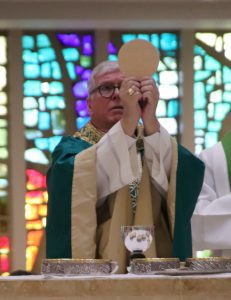
It has long been a Catholic understanding that when circumstances prevent one from receiving Holy Communion, it is possible to make an Act of Spiritual Communion which is a source of grace. Spiritual Communion means uniting one’s self in prayer with Christ’s sacrifice and worshiping Him in His Body and Blood.
The most common reason for making an Act of Spiritual Communion is when a person cannot attend Mass, as is the case during the ongoing coronavirus pandemic. Acts of Spiritual Communion increase our desire to receive sacramental Communion and help us avoid the sins that would make us unable to receive Holy Communion worthily.
For all who will not be able to receive the Holy Eucharist in person, consider this special prayer, an Act of Spiritual Communion:
My Jesus,
I believe that You are present in the Most Holy Sacrament.
I love You above all things, and I desire to receive You into my soul.
Since I cannot at this moment receive You sacramentally, come at least spiritually into my heart.
I embrace You as if You were already there and unite myself wholly to You.
Never permit me to be separated from You.
Amen.
Resources online
A special coronavirus webpage is located on the Diocese of Venice website homepage at www.dioceseofvenice.org.
Resources include links to the Mass, the prayer for Act of the Spiritual Communion, videos of the Stations of the Cross, Divine Mercy Chaplet and Pray the Rosary by following the links for the Diocese response to Coronavirus included on the Diocese homepage. The U.S. Conference of Catholic Bishops website, www.usccb.org, also posts the daily Mass readings.
The Diocese of Venice Mass is streamed live at 9:15 a.m. daily from the Catholic Center in Venice. Meanwhile, Mass is being streamed live from many Parishes daily (some on weekends only) throughout the Diocese of Venice (See updated list on Diocese website). Most streams are available with links through the Parish websites or through Facebook (to watch a live stream on Facebook, you do not need an account) or YouTube. Check with your Parish if you are having trouble finding the Mass or for more details.
Additionally, Magnificat is offering the online version of this devotional free at https://us.magnificat.net/free.
The Televised Mass for the Homebound is available throughout the Diocese each Sunday. In northern parts of the Diocese (Manatee, Highlands, Hardee, Sarasota, DeSoto and Charlotte counties) the Mass airs on television at 9:30 a.m. on the CW Network. In the southern portions of the Diocese (Collier, Lee, Glades, Hendry, Charlotte counties) the Mass airs at 10:30 a.m., on WFTX-TV (FOX-4). This same Mass can be found on the Diocese of Venice website, www.dioceseofvenice.org/tvmass. Please check local listings for channel information.
Parish donations
During this challenging time in the life and mission of the Diocese of Venice, our Parishes face increased risk of financial shortfalls due to the coronavirus (COVID-19) pandemic and its effects on everyday life. Parishes depend on weekly financial gifts to continue their ministries, especially in this critical time of crisis.
The Diocese of Venice is providing an online platform and encourages the Faithful to support their Parish. Please visit https://dioceseofvenice.org/ways-to-give/parish-donations-online/ to donate to your Parish.
The Faithful may also contribute through their usual channels (e.g., envelopes, and through the Parish online giving option). Together we will navigate through this crisis, provide assistance to those in need, and secure the road ahead for the Parishes within the Diocese of Venice.
Please continue to pray for the repose of those who have died, for the recovery of those who are sick, for the strength of healthcare workers and caregivers, as well as for an end to this health crisis. Thank you for your generosity.
Prayers
Prayer Against Coronavirus
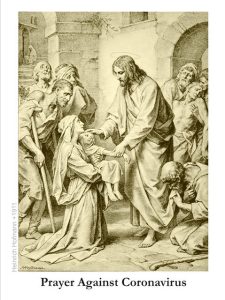
Lord Jesus Christ, our Divine physician, we ask you to guard and protect us from Coronavirus COVID-19 and all serious illness. For all that have died from it, have mercy; for those that are ill now, bring healing. For those searching for a remedy, enlighten them; for medical caregivers helping the sick, strengthen and shield them. For those working to contain the spread, grant them success; for the afraid, grant peace. May your precious blood be our defense and salvation. By your grace, may you turn the evil of disease into moments of consolation and hope. May we always fear the contagion of sin more than any illness. We abandon ourselves to you infinite. Amen
By Pedro de la Cruz
Oración contra el Coronavirus
Señor Jesucristo, nuestro Médico Divino, te pedimos que nos guardes y protejas del Coronavirus COVID-19 y de toda enfermedad grave. Por todos los que han perdido la vida por causa del virus, ten piedad; por los que están enfermos ahora, sánalos. Por los que buscan su cura, ilumínalos; por el personal médico que cuida de los enfermos, fortalécelos y protéjelos. Por los que trabajan para contener al virus, que sean existosos; por los que temen dáles la paz. Que tu preciosa sangre sea nuestro escudo y salvación. Por tu gracia, convierte a la maldad de esta enfermedad en momentos de consuelo y esperanza. Que siempre temamos más al contagió del pecado que al de cualquier enfermedad. Nos entregamos a tu infinita misericordia. Amén.
By Pedro de la Cruz
Prayer to Our Lady of Guadalupe for Protection from the Coronavirus
Holy Virgin of Guadalupe,
Queen of the Angels and Mother of the Americas.
We fly to you today as your beloved children.
We ask you to intercede for us with your Son,
as you did at the wedding in Cana.
Pray for us, loving Mother,
and gain for our nation and world,
and for all our families and loved ones,
the protection of your holy angels,
that we may be spared the worst of this illness.
For those already afflicted,
we ask you to obtain the grace of healing and deliverance.
Hear the cries of those who are vulnerable and fearful,
wipe away their tears and help them to trust.
In this time of trial and testing,
teach all of us in the Church to love one another and to be patient and kind.
Help us to bring the peace of Jesus to our land and to our hearts.
We come to you with confidence,
knowing that you truly are our compassionate mother,
health of the sick and cause of our joy.
Shelter us under the mantle of your protection,
keep us in the embrace of your arms,
help us always to know the love of your Son, Jesus.
Amen.
Courtesy of the U.S. Conference of Catholic Bishops
Oración a Nuestra Señora de Guadalupe para la Protección del Coronavirus
Virgen Santísima de Guadalupe,
Reina de los Ángeles y Madre de las Américas.
Acudimos a ti hoy como tus amados hijos.
Te pedimos que intercedas por nosotros con tu Hijo,
como lo hiciste en las bodas de Caná.
Ruega por nosotros, Madre amorosa,
y obtén para nuestra nación, nuestro mundo,
y para todas nuestras familias y seres queridos,
la protección de tus santos ángeles,
para que podamos salvarnos de lo peor de esta enfermedad.
Para aquellos que ya están afectados,
te pedimos que les concedas la gracia de la sanación y
la liberación.
Escucha los gritos de aquellos que son vulnerables y temerosos,
seca sus lágrimas y ayúdalos a confiar.
En este tiempo de dificultad y prueba,
enséñanos a todos en la Iglesia a amarnos los unos a los otros
y a ser pacientes y amables.
Ayúdanos a llevar la paz de Jesús a nuestra tierra y a nuestros
corazones.
Acudimos a ti con confianza, sabiendo que realmente eres
nuestra madre compasiva,
la salud de los enfermos y la causa de nuestra alegría.
Refúgianos bajo el manto de tu protección, mantennos
en el abrazo de tus brazos,
ayúdanos a conocer siempre el amor de tu Hijo, Jesús.
Amén.
Cortesía de la Conferencia de Obispos Católicos de EE. UU.






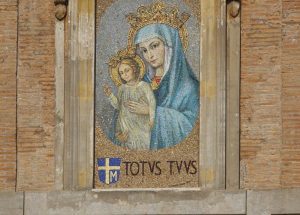 The Diocese of Venice in Florida encourages the faithful to join the United States Conference of Catholic Bishops (USCCB) for a live stream of the Re-Consecration of our nation to the Protection of the Blessed Mother under the title of Mary, Mother of the Church. This will give the Church the occasion to pray for Our Lady’s continued protection of the vulnerable, healing of the unwell, and wisdom for those who work to cure this terrible virus.
The Diocese of Venice in Florida encourages the faithful to join the United States Conference of Catholic Bishops (USCCB) for a live stream of the Re-Consecration of our nation to the Protection of the Blessed Mother under the title of Mary, Mother of the Church. This will give the Church the occasion to pray for Our Lady’s continued protection of the vulnerable, healing of the unwell, and wisdom for those who work to cure this terrible virus.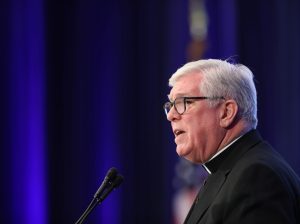 During that span, Bishop Dewane spoke on behalf of the U.S. Conference on issues of health care, human dignity, human rights, development, poverty and justice.
During that span, Bishop Dewane spoke on behalf of the U.S. Conference on issues of health care, human dignity, human rights, development, poverty and justice.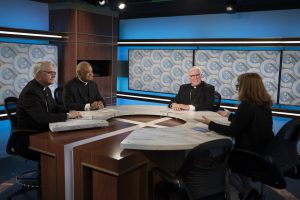 The discussion highlighted not only the consistency of church teaching against capital punishment but also what Catholics could do to learn more about what the Catholic Church has to say on this issue.
The discussion highlighted not only the consistency of church teaching against capital punishment but also what Catholics could do to learn more about what the Catholic Church has to say on this issue.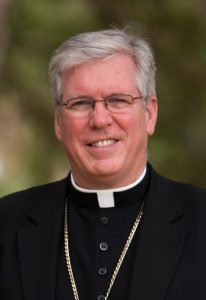 At its core, this is a moral issue, not merely a political debate. This is about the sanctity of the family, a bond that cannot be duplicated or replaced. While we may differ in our views on how to fix the immigration crisis, we can all agree that returning children to their parents must be of utmost priority.
At its core, this is a moral issue, not merely a political debate. This is about the sanctity of the family, a bond that cannot be duplicated or replaced. While we may differ in our views on how to fix the immigration crisis, we can all agree that returning children to their parents must be of utmost priority.